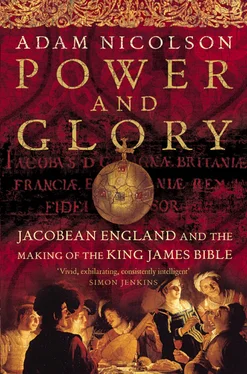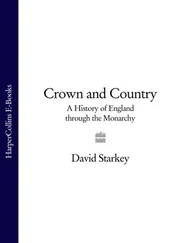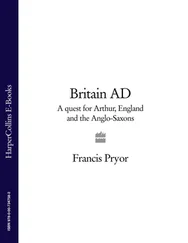1 ...8 9 10 12 13 14 ...17 The suggestion of a conference appalled the bishops. All these old issues which had riven the church in the 1570s and â80s, and which had been effectively shut down since then by rigid suppression, were now to be given new life. Jamesâs all-too-Scottish and intellectual readiness to talk through difficult questions was going to release a log-jam. Everything in the new Jacobean England suddenly felt more fluid than before and a conference with the Puritans on the future governance and doctrines of the English Church was going too far.
One needs reminding, perhaps, of just how passionate was the loathing among Puritans of that symbolic strain in the English Church. Few modern Christians, however severe, would be quite as brave as Richard Parker, the author of A Scholasticall Discourse against Symbolizing with AntiChrist in Ceremonies: especially in the Signe of the Crosse , published in London in 1607, who was keen to point out to the ignorant, at some length, âthe idolatrie of the Crosse, the Superstition of the Crosse, the Hipocrisie of the Crosse, the impietie of the Crosse, the injustice of the Crosse and the soule murther of the Crosseâ. The cross was âa part of deuill worship ⦠The vsing of the Crosse is but an idle apishe toye, and lighter than the surplice, which is also too light.â
Why did these things matter so much? Why did people care about the wearing of a surplice, or the emblem of the cross, or the use of a ring in the wedding service? Why was so much agony expended on the relative weight of symbol and word, of text and ceremony, on the precise bodily movements of Englishmen at prayer? There is a straightforward answer: two entirely different and opposing worldviews, and two views of the nature of human beings, are bound up in this debate. For the strict reformers, only the naked intellectual engagement with the complexities of a rational God would do. All else was confusion and obfuscation. The word was the route to understanding. Everything else was mud in the water. Men were essentially thinking and spiritual creatures. Bodily observance was an irrelevance. A Calvinist religion, as Milton later said, was âwinnowâd, and sifted, from the chaffe of overdated Ceremoniesâ. It was free of irrelevance. The only desire of ceremonialists like Lancelot Andrewes and his disciple William Laud was to distort this precious purified religion of the word. âThey hallowâd it, they fumâd it, they sprinclâd it, they be deckât it,â Milton raged, ânot in robes of pure innocency, but of pure Linnen, with other deformed, and fantastik dresses in Palls, and Miters, gold, and guegaws fetcht from Arons old wardrobe.â
For those like Andrewes who held on to the place of symbol in the life of religion (and they were a small if powerful minority even among the bishops of the Jacobean church), and who saw God not as an intellectual system but as a mystery, the stripping of the altars was an unpardonable arrogance. The church had always used ritual and ceremony to approach the divine. It was the conduit through which grace could reach the believer. Only big-headed modern ânovelistsâ could assume that, without any guidance from the wisdom of the church fathers, ordinary people could approach God direct, as no one had done since the Apostles. Mystery for Andrewes required ceremony and a respect for the inherited past.
Bowing to the name of Jesus was the hinge and fulcrum of this debate. The later pamphleteer William Prynne (whose cheeks were to be branded on the orders of William Laud with the letters SL standing for âSeditious Libellerâ â Prynne called them âStigmata Laudianaâ) considered the habit of bowing âa meere Popish Inuention of punie timesâ. And, anyway, bowing at the name of Jesus âdisturbes and interupts men in their deuotions, by auocating their bodies and minds from those serious duties about which they are imployed and to which they should be wholy intentâ. Prayer was as serious and technical as a law lecture; and what did bobbing and dipping have to do with that? A habit of mind further from the passionate emotionalism of Andrewesâs private prayers it would be difficult to imagine. These were the polarities across which the King James Bible was to have its life and being.
The organisers of the petitioning campaign were canny, or at least thought they were. The line they had to follow was precise. Even if the bishops felt alarmed at any kind of change to the status quo, they knew James himself would be quite open to an examination of the theological basis of the Church of England. It was one of his areas of expertise and he was relaxed and even intrigued by the idea of discussing doctrine and the form of church ceremonial. He had been brawling with the Scottish Presbyterians on these subjects for years.
What he would not tolerate, however, was any suggestion of his own royal authority being questioned. The royal supremacy over church and state was the foundation of his position as King of England, the very reason he felt so at home in this marvellous new country he had inherited. That melding of secular and religious authority had been the secret at the heart of the immensely successful Tudor monarchy. In Scotland, and in other fully reformed countries in Europe, the new churches had established themselves as powers quite distinct from and independent of the state. In Catholic countries all the potency of the Protestant idea, the great revolutionary engine of sixteenth-century Europe, had been put to ends directly in conflict with the state. Uniquely in England, an increasingly powerful state had made itself synonymous with a â more or less â Protestant Church. This state Protestantism was the great and accidental discovery of the English Reformation. It bridged the divisions which in the rest of Europe had given rise to decades of civil war.
But now in the summer and autumn of 1603, the existence of a Protestant state church made the Puritansâ task extremely tender. Precisely because the head of the church was also the head of state, it was critical for their cause to separate theological questions from political. They had to establish themselves as politically loyal even while asking for changes to the state religion and the form of the state church. And it was equally critical for the bishops to conflate them. Throughout the summer the bishops maintained that any questioning of the doctrine and articles of the Church of England was politically subversive, dangerous and to be expunged. Anti-Puritan propaganda flooded the country. The Puritans were teetering along a narrow rock ledge and they wrapped their suggestions in swathes of submissive cotton wool. They addressed James, they said, âneither as factious men affecting a popular parity in the Church [no hint of getting rid of the bishops], nor as schismatics aiming at the dissolution of the state ecclesiastical [they wanted to distinguish themselves from the true extremists, who took from the New Testament that each congregation should be independent and free of all worldly authority] but as faithful servants of Christ and loyal subjectsâ. Describing themselves as âMinisters of the Gospell, that desier not a disorderly innovation [nothing was more loathsome to the seventeenth-century mind than the idea of innovation; ânovelistâ was a term of abuse, âprimitivistâ of the highest praise] but a due and godlie reformationâ, they laid on the supplicatory language:
Thus with all dutifull submission, referring our selues to your Maiesties pleasure for your gracious aunswere, as God shall direct you, wee most humblie recommend your Highness to the Devine maiestie, whom wee beseech for Christ, his sake to dispose your royall harte to doe herein what shalbee to his glorie, the good of his Churche, and your endles Comforte.
Читать дальше












